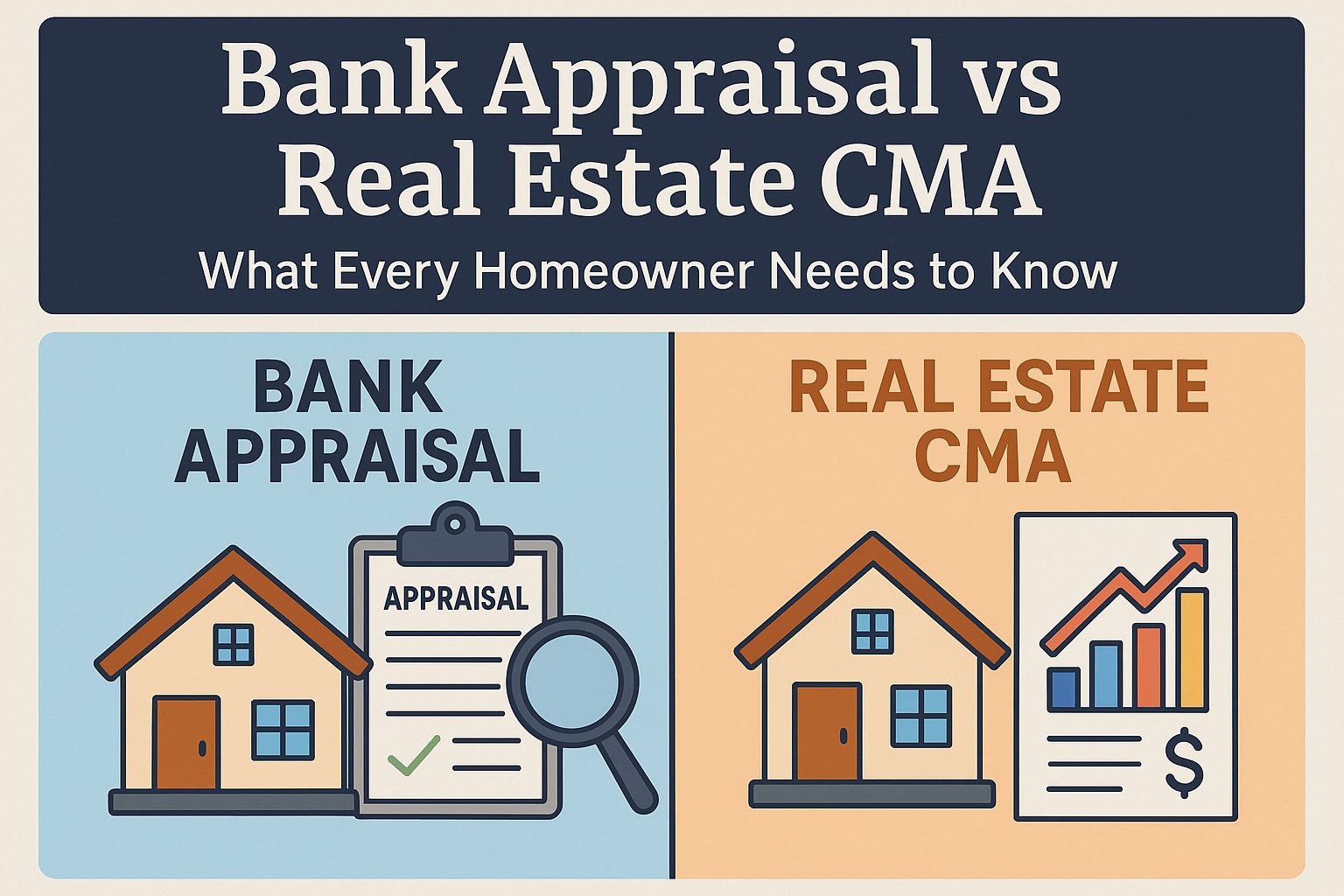Bank Appraisal vs Real Estate CMA in Nova Scotia: Complete Guide for Homeowners
When buying, selling, or refinancing property in Nova Scotia, you’ll encounter two essential property valuation methods: bank appraisals and real estate Comparative Market Analyses (CMAs). Whether you’re in Halifax, Sydney, Truro, or any Nova Scotia community, understanding these differences can save you time, money, and frustration in your Nova Scotia real estate journey.
What Is a Bank Appraisal in Nova Scotia?
A bank appraisal is a professional property valuation conducted by a licensed appraiser registered with the Appraisal Institute of Canada (AIC) or holding Nova Scotia credentials. Canadian lenders require these formal assessments during mortgage processes to ensure Maritime properties serve as adequate collateral for loan amounts.
Key Features of Nova Scotia Bank Appraisals:
Professional Expertise: Only licensed appraisers certified in Nova Scotia can perform bank appraisals. These professionals must understand market conditions, including seasonal fluctuations common in Atlantic Canada real estate.
Comprehensive Property Assessment: The appraiser conducts thorough on-site inspections, evaluating Nova Scotia-specific factors like coastal proximity, winter heating systems, and construction standards. They document everything from foundation conditions to recent energy efficiency upgrades popular in Atlantic Canada.
Local Comparative Analysis: Using recent sales data from Nova Scotia’s MLS system, appraisers analyze comparable properties within Halifax Regional Municipality, Cape Breton Regional Municipality, or other Maritime regions to determine fair market value.
Regulatory Compliance: Nova Scotia appraisals must meet Canadian Uniform Standards of Professional Appraisal Practice (CUSPAP) guidelines and comply with provincial real estate regulations.
When Bank Appraisals Are Required in Nova Scotia:
- Mortgage applications through Canadian banks (RBC, TD, Scotiabank, etc.)
- Refinancing existing properties
- Home equity loans in Nova Scotia (HELOC)
- Estate planning for Atlantic Canadian properties
- Property tax appeals with Nova Scotia Assessment
- Legal proceedings involving real estate values
What Is a Real Estate CMA in Nova Scotia?
A Comparative Market Analysis (CMA) in Nova Scotia is an informal property valuation prepared by a licensed Nova Scotia real estate agent to help determine appropriate listing prices for Maritime properties. Licensed through the Nova Scotia Real Estate Commission (NSREC), agents provide these analyses as complimentary services to potential clients.
Key Features of Nova Scotia Real Estate CMAs:
Nova Scotia Market Expertise: Experienced Nova Scotia agents understand Atlantic Canadian market dynamics, including seasonal trends, Halifax urban vs. rural pricing differences, and Cape Breton market conditions.
MLS Access: Nova Scotia agents access comprehensive local MLS data, including recent sales in Halifax, Dartmouth, Bedford, Truro, Sydney, New Glasgow, and other Atlantic communities.
Local Pricing Strategy: CMAs consider Nova Scotia-specific factors like proximity to Halifax Harbour, Cabot Trail tourism areas, or major employers when determining competitive asking prices.
Market Timing: Understanding Nova Scotia’s real estate seasons helps agents recommend optimal listing timing for maximum market exposure.
When CMAs Are Most Useful in Nova Scotia:
- Setting listing prices for Halifax Regional Municipality properties
- Evaluating Cape Breton Regional Municipality market values
- Understanding Atlantic Canadian neighborhood trends
- Planning Nova Scotia real estate investments
- Pricing rural Nova Scotia properties appropriately
Bank Appraisal vs CMA: Nova Scotia Comparison
| Feature | Nova Scotia Bank Appraisal | Maritime Real Estate CMA |
|---|---|---|
| Who Conducts It | AIC-licensed appraiser | NSREC-licensed real estate agent |
| Primary Purpose | Canadian mortgage approval | Nova Scotia listing price guidance |
| Legal Status | Legally binding under Canadian law | Informal market estimate |
| Cost | $400-$800 CAD (typical Atlantic Canada range) | Usually free to Nova Scotia sellers |
| Timeframe | 1-2 weeks (Maritime standard) | 1-3 days for Nova Scotia properties |
| Use Cases | Canadian bank requirements | Local market pricing strategy |
| Market Focus | Conservative, meets lender requirements | Current Nova Scotia market conditions |
Understanding Nova Scotia Property Valuations
Nova Scotia Market Factors:
Seasonal Considerations: Nova Scotia’s real estate market experiences distinct seasonal patterns. Spring and summer typically see increased activity, while winter months may slow transactions in rural areas.
Geographic Variations: Halifax Regional Municipality properties often command premium prices compared to rural Nova Scotia locations. Cape Breton markets may have different dynamics than mainland communities.
Economic Influences: Major Nova Scotia employers, including government positions in Halifax, tourism industries, and Atlantic Canadian resource sectors, significantly impact local property values.
Halifax Regional Municipality Specifics:
Properties in Halifax, Dartmouth, Bedford, and surrounding HRM areas benefit from proximity to:
- Halifax Stanfield International Airport
- Major universities (Dalhousie, Saint Mary’s)
- Halifax Harbour waterfront
- Downtown Halifax business district
Nova Scotia Regulatory Considerations
Provincial Requirements:
Property Transfer Tax: Nova Scotia charges deed transfer tax on property transactions, calculated based on appraised values.
Nova Scotia Assessment: The provincial assessment system uses mass appraisal techniques, different from individual bank appraisals or CMAs.
NSREC Regulations: Real estate agents providing CMAs must comply with Nova Scotia Real Estate Commission guidelines and continuing education requirements.
Tips for Nova Scotia Homeowners
Before Getting a Appraisal:
- Complete winterization improvements common in Atlantic Canada
- Document energy efficiency upgrades (important in Nova Scotia’s climate)
- Provide information about coastal or waterfront features
- Research recent Halifax or regional sales
When Requesting a Nova Scotia CMA:
- Choose agents experienced in your specific local market
- Ask about their knowledge of Halifax vs. rural Nova Scotia markets
- Understand seasonal timing recommendations for Atlantic Canada
- Request information about Cape Breton or mainland Nova Scotia pricing differences

 Facebook
Facebook
 X
X
 Pinterest
Pinterest
 Copy Link
Copy Link

